












Finance Minister, Ken Ofori-Atta, has called on the legislature to expedite the passage of three critical bills that are remaining to enable government complete four of ve agreed prior actions in the Sta Level Agreement with the International Monetary Fund (IMF).
The approval of the bills is expected to bring it one step closer to securing a $3 billion IMF bailout, to restore macro-economic stability, ensure debt sustainability as well as provide critical social protection for the benet of Ghanaians.
Presenting a statement on the oor of parliament on Thursday on Ghana’s Domestic Debt Exchange Programme (DDE), Mr. Ofori-Atta told the lawmakers that government launched the DDE to restructure about GHc137bn worth of government bonds and notes.
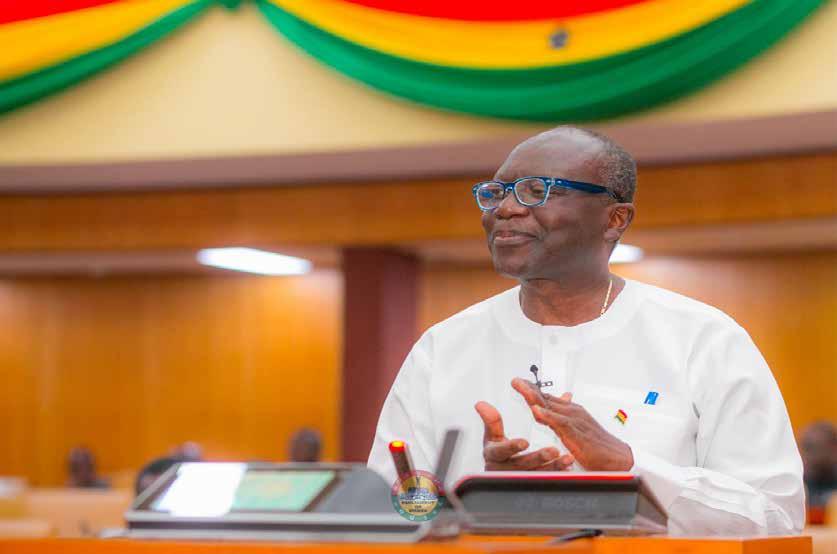
He said “all these e orts would be greatly enhanced if the Income Tax (Amendment) Bill, Excise Duty & Excise Tax Stamp (Amendment) Bills as well as the Growth and Sustainability Levy Bill, which are outstanding in this august House could be prioritized
and passed.

The passage of these Bills will enable Government to complete four (4) of ve (5) agreed Prior Actions in the Sta Level Agreement since Tari adjustment by the PURC, Publication of the Auditor-General’s Report on COVID-19 Spending, and Onboarding of GETFUND, DACF and Road Fund on the GIFMIS have all been completed.”
According to the nance minister, he cannot emphasize enough, the need to secure the Board Approval for the IMF Programme by the end of March, 2023 and appealed to parliament to prioritise the approval of the outstanding Revenue Bills and the various concessional facilities.
The nance ministry on Tuesday said that around 85% of eligible bondholders had tendered in for its domestic debt exchange programme.
The announcement followed ve extensions of the scheme's deadline, as the country battled to secure its targeted 80% subscription rate. Holdouts persisted despite several revisions to the initial debt-swap o er.


Further, he disclosed that government has begun working on “necessary scal adjustments” after the debt operation is completed and is expected to present the modi cations to the legislature for consideration and approval.
Mr. Ofori-Atta stated that government is mindful of the Exchange’s rami cations on the country’s nancial health. “As a result, the government is developing several prudential measures to mitigate the potential impact on domestic creditors, considering the need to preserve nancial stability. Billions of taxpayer’s monies were used between 2017 and 2019 to rescue the nancial sector. We have no intention to imperil that work and we are determined to protect banks operating in Ghana and strengthen their capacity to nance the economic recovery and growth we see before us.”
Ghana is battling its way out of a generational economic crisis by hiking interest rates at record speeds, cutting spending, and restructuring its debt as a condition to obtain support approval from the IMF's Executive Board.
"We control a substantial portion of the Ghanaian economy... It is not about the big things; it is the little things that we are not doing that have put us all in this position. "It is our problem, and we all have to work hard to jumpstart the economy."
These were the words of Ambassador Edward Boateng, Director General of the State Interests and Governance Authority (SIGA), as he rallied the leadership of the various speci ed entities to "put their best foot forward" and support e orts by the government to put the economy back on track.
The Chief Executive O cers and Board Chairs of the State-owned Enterprise (SOEs) gathered at Kwahu Nkwatia in the Eastern Region for SIGA’s annual stakeholder meeting, which was in accordance with Section 30 of the SIGA Act 2019 (Act 990).
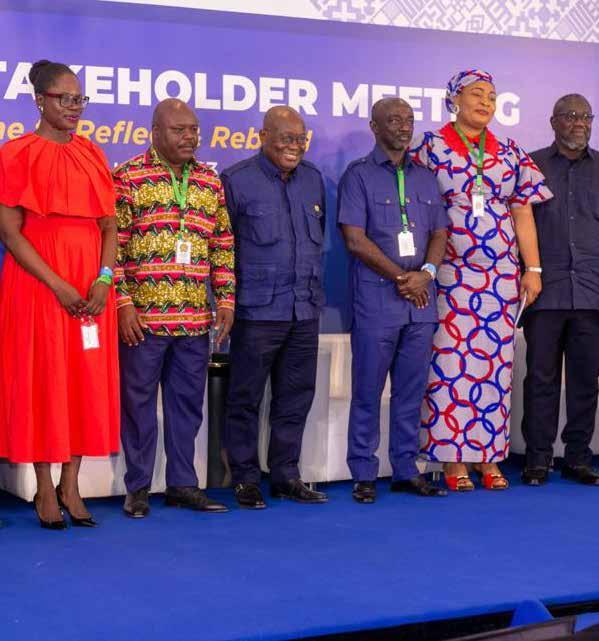
The Stakeholder Meeting, which was on the theme: "A Time to Re ect and Rebuild," discussed challenges a ecting the SOEs and ways the entities could improve their performance and achieve the president’s vision of contributing 30 percent to Ghana's gross domestic product.
It was a perfect atmosphere to echo the important role that SOEs play in the development of the nation and emphasized the need for the entities to comply with the directives of SIGA and strive to meet certain performance targets.
Since assuming the position of Director General, Ambassador Boateng has implemented wide-ranging policies with the aim of restoring hope in the SEOs and pushing them to be more accountable to achieve pro tability.
Key among them was the consistent engagement with the leadership of the speci ed entities, the signing of performance contracts with the entities, and the implementation of the Public Enterprises League Table to engender competition among the SOEs.
Ambassador Boateng told journalists at the conference that there had been an improvement in the performance of SOEs, especially with the rate of compliance with the submission of management accounts mandated by law.
"Just two years ago, if you look at the national accounts, only 5 SOEs were presenting their accounts, and that contributed very minimal." "Last year, in 2022, we were able to push it to 47, bringing their contribution to 21 percent," he explained.
Ambassador Boateng led by example when he arranged for the CEOs and Board Chairs to be conveyed by STC buses to the conference to cut cost. He told the participants that the move saved the authority about GHS 100, 000 on fuel.
Ambassador Boateng charged the speci ed entities to publicize their success stories to enable the public to
sustainable pro tability. He extolled SIGA for doing a "yeoman’s job" by pushing for compliance on the submission of management accounts on the part of the SOEs to consolidate the national accounts.
President Akufo-Addo charged the SOEs to submit all their management accounts to the Controller and Accountant General's Department by February 28, 2022. He also directed the SOEs to submit to
process," he said.
The number of nancial statements submitted by SOEs in the consolidated national accounts rose from 19 in 2020 to 47 in 2021.
In 2020, the 19 SOEs included in the national accounts contributed 30 percent to the national assets. It further increased to 49 percent when 47 SOEs were included in the 2021 national accounts.
Described by Forbes as one of the “ ve leading global programmes supporting the next generation of entrepreneurs”, the programme dubbed, ‘Enterprise Challenge’, works with young people to develop business ideas that positively impact environmental issues in their communities.
A release issued in Accra said 25 teams participated in the 2022/23 edition of the programme with ve teams eventually being shortlisted for the nals. The teams, which participated in the nals included Team Mervs from Kinbu SHS, Team Doyen from Sacred Heart SHS, Teams Texco and Flow from His Majesty’s SHS and Team Phoenix from Brainy Brain SHS.
They were then given four sessions with a green business mentor to support each team to ne-tune their business ideas with particular emphasis on a cost and pro t structure, as well as e ective sales pitching techniques ahead of the nal event.
The winning pitch came from an all-female team from Kinbu SHS.

They presented an innovative green business concept of turning palm kernel waste, generated from making palm oil, into briquettes to replace the use of charcoal and wood cooking fuel.
money from Fidelity Bank to start the process of registering their business and building on their business idea and turning it into a viable commercial entity Speaking at the event, the founder of Fidelity Bank and a member of the Prince’s Trust International Africa Advisory Board, Edward E ah,
Ghana indeed has a bright future. The ability of these young ones to develop environmentally friendly green business ideas and the con dence with which they articulated these ideas is quite impressive.
I am particularly impressed with their level of environmental awareness, and I believe
such programmes will go a long way to help Ghana and Africa achieve the SDGs,”
Presenting the prize to the team, the Head, Digital and Brand Marketing of Fidelity Bank, Eric Frempong Amponsah, said: “Fidelity Bank is proud to partner with Prince’s Trust International on this programme.
Serving the community is one of our core values and education is a key pillar of our social impact initiatives.”
students- Fidelity Bank Ghana and Environment
360 have held a programme that seeks to introduce senior high school (SHS) students to business concepts and entrepreneurship.
Founder and Chief Executive O cer
(CEO) of AZA Finance, Elizabeth Rossiello, has said that the gradual move to web-based payment solutions, from telco-operated platforms, will lead to enhanced e ciency, lowered cost and greater adoption of digital nancial solutions on the continent.

Since its introduction in Africa almost 20 years ago, mobile money has evolved to become one of the preferred payment options, resulting in the continent accounting for 70 percent of the US$1 trillion in mobile money processed across the globe in 2021, as the value of Africa’s mobile money transactions soared by 39 percent year-on-year, from US$495 billion in 2020 to US$701.4 billion the following year.
But Mrs. Rossiello believes that in spite of the strides made by mobile money, the emergence of web-based solutions will drive competition as surmounting geographical barriers become easier and the customer would be the better for it. “Moving away from solutions o ered primarily by telcos to web-based o erings takes it global which makes it more competitive and better for the user,” she said in an interaction with the B&FT during a recent working visit to the country.
She added that building on Ghana’s recent markedly improved nancial inclusion performance, which rose to 68 percent in 2021 from 58 percent in
investment to make the internet more accessible across the country.
Noting that access to web-based FinTech solutions remains concentrated in urban and peri-urban centres, she said it highlights room for growth in the adoption of such services. “The internet penetration rate is still relatively low, so it o ers much room for growth as we do not have a lot of internet access in the rural areas so they cannot access these web-based products, so for now, we see a heavy concentration on USSD products and similar telco-based solutions but that will change as internet access improves,” she stated.
According to analyses by the intelli-
Kepios, the internet penetration rate in the country stood at 53 percent at the beginning of the year, from a total of 44.9 million cellular mobile connections. The rate places Ghana at number 12 on the continent.
Also in the country’s favour is the comparatively low internet usage cost, as captured in the 2022 Worldwide Mobile Pricing report, which surveyed 233 countries and territories and shows that ve of the 10 most expensive countries (US$10 or more for 1 gigabyte) to buy mobile data in the world are in sub-Saharan Africa, with the same amount of data selling at US$0.61, on average, in Ghana.
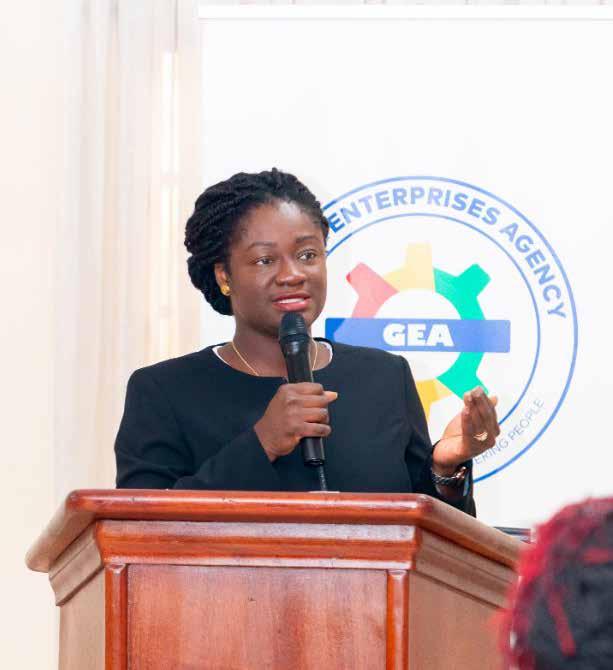
their growth. Women-owned businesses, businesses utilizing green technology, SMEs owned by young people, and businesses run by People with Disabilities (PWDs) will receive higher priorities.
Speaking with the press in Accra on Wednesday, during the sidelines of the event, CEO of Ghana Enterprises Agency, Mrs. Kosi Yankey-Ayeh, said “We realised that to be able to get people to apply and apply well, and to allow a broader stakeholder to be able to take advantage of the opportunity, we need to engage
The reason we need to do that is if we want to build high private sector growth, then we need to look at how best to bring about that kind of transformation.
About 200 SMEs have come in to participate in today’s orientation, they were selected carefully by the associations to come together and those we have worked with in the past and have been
By Eugene Davisable to use the support to transform their businesses to be a part of this,” she said.
I know there were 2,000 people, you know this is a very concentrated programme -so 2,000 people have gone through the application process and we looking to have a revolving SME programme for them. So, we take the rst and second batch and work with them. The focus is really technical assistance and then those who show success and have potential to grow would be given some form of funding.
GEA last month launched the new SME High Growth Programme to build upon and sustain the successes attained under the several SME-focused support programmes.
Additionally, a sum of US$20 million (in cedis equivalent) has been allocated for
the agship SME High Growth Program, and the program's key distinguishing features include the provision of training in business and nancial management, taxation, and regulatory compliance because the goal is to provide SMEs with practical knowledge of the Ghanaian tax system as well as the basic principles of taxation, information technology in business, and regulatory compliance.
Smaller enterprises should show that they have six (6) to thirty (30) employees and/or yearly sales of between GHS 180,000 and GHS 7.2 million, while medium-sized businesses should show that they have between 31 and 100 employees and GHS 7.2 million to GHS 21.6 million in annual sales.
In accordance with the Ghana Economic
Transformation (GET) Project, the GEA has so far successfully carried out three interventions, including this current SME High Growth Programme and phases 1 and 2 of the COVID-19 Response Grant Programme.
The program will enable these businesses to become not only more competitive and export-oriented, but also to create
new jobs, according to Nana Ama Dokua Asiamah Adjei, Deputy Minister of Trade & Industry, who also encouraged all quali ed SMEs to take advantage of this initiative in order to build and scale their businesses.
All quali ed applicants can apply to by completing a registration form via the GEA website:
Assets of the Kintampo Rural Bank in the Bono East Region grew by 12.92 per cent in 2021, strengthening the bank’s e orts to facilitate the socio-economic growth of the region.
Mr Martin Mensah, the Chief Executive O cer of the Bank, said the shareholders’ fund also increased from GH¢10.94 million in 2020 to GH¢12.30 million in 2021, a marginal increment of 12.43 per cent.

In an interview with the Ghana News Agency (GNA) at Kintampo, Mr Mensah said customer deposits also grew by 10.65 per cent in 2021 and the bank also spent GH¢29,690 on corporate social responsibility.
The amount was channeled into social interventions in health, education and agriculture as well as community development.
Mr Mensah said the bank was collaborating with the Ministry of Gender, Children and Social Protection, and the Ghana Interbank Payment and Settlement System (GiPSS) to ensure beneciaries of the livelihood Empowerment Against Poverty (LEAP) received their allowances without di culties.
Currently, it is serving more than 8,000 LEAP bene ciaries in the Kintampo South, Kintampo North, and Techiman
North districts.
In its quest to support agriculture and the food value chain, the bank is partnering with the Mobilising Finance in Agriculture (MFA) to implement a four-year agriculture nancing project in the area.
The Feed the Future Ghana MFA, launched in 2021, is a four-year, $19 million USAID Activity that aims to increase the availability of commercial nancing for agriculture to facilitate capital investment and promote trade. The project aimed at increasing access to agricultural nance for selected staples including maize, groundnut, shea, soya bean, mango and cashew and other high-value export commodities in the region.
Mr Mensah called on shareholders and customers to remain loyal and support the bank’s operations.
Established on October 28, 1978, the Kintampo Rural Bank was granted license on January 10, 1984.
It was the rst rural bank to be established in the Bono, Bono East and Ahafo regions and the seventh in Ghana.
Source: GNA
The Minister for Lands and Natural Resources, Samuel A. Jinapor, has urged the Nungua Traditional Council and all stakeholders involved in the impasse over the Ramsar site to exercise restraint as his out t seeks to nd an amicable solution to the issue.
Addressing the Chiefs and Elders of the Nungua Traditional Council on Wednesday, February 15, 2023, the lands minister called for a cease re from all the parties and assured that the Ministry is working assiduously to nd quick solution the matter.
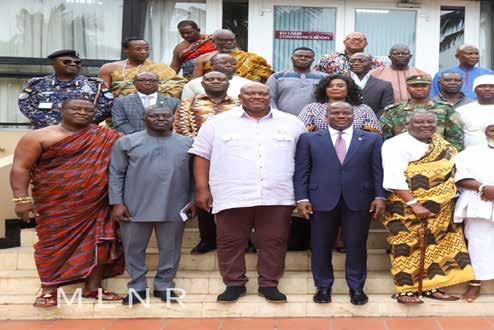
He assured that the Ministry is working to ensure that a mutually-satisfying resolution will be reached.
He also appealed to the council to keep faith in the Ministry and give the government its full support as it mediates the various issues relative to the Ramsar site.
Hon. Samuel A. Jinapor explained that
the Akufo-Addo administration is on a path to regularize all state lands and that in a matter of weeks, the challenge pertaining to the Sakumono Ramsar site will be amicably solved.
According to him, the core area marked as the Ramsar site has international and environmental signi cance and for that matter will continue to serve the purpose for which it was earmarked.
He, however, warned that whiles discus sions are ongoing to bring nality to the matter, nobody should be seen to be undertaking any form of activities on any part of the lands.
He indicated that a taskforce from the Greater Regional Security Council (REGSEC) has been tasked with the responsibility of protecting the area and that a taskforce will be commissioned to shield the place from all kinds of encroachment.
Hon. Henry Quartey, the Greater Accra
the region and vowed that initiate measures to protect the lands.
He explained that there are security concerns and that his out t will work with the Ministry of Lands to ensure that peace prevails.
The Paramount Chief of Nungua Tradi-
of government and praised the Ministry for being candid and forthright with the council.
He said the council is deeply concerned with encroachment of the lands and will work with the state to address the challenges.
FBNBank Ghana is showering gratitude on its customers by giving them a special treat as part of the National Chocolate Day celebrations which falls on 14 February 2023.
In a statement released by the Bank, it stated that “FBNBank is renewing its commitment to its customers and assuring them of a great year. We rst of all like to show our appreciation for the wonderful relationship throughout 2022. You have been very loyal and supportive as we walk together towards our joint objectives.”
As part of the Bank’s plans, all customers who visit the branches would receive a very Ghanaian welcome and also be o ered made-in-Ghana chocolate.
It is expected that the Bank will engage its customers and clients across all its 23 branches and three agencies in Ghana. Customers should expect some exciting activities within the Bank’s branches according to the Bank’s statement.
Speaking about the Chocolate Day activity, Agatha Nketsia, Head, Enterprise Process Improvement (EPI) of FBNBank stated that, “over the years, FBNBank has developed a very strong relationship with its customers. We have gotten to know them better, understanding their evolving needs and challenges as we walk together. By so doing we have also been able to design products and services for them in order to address these needs. In all these we cannot help to point out how grateful we are in how supportive the customers have been and how very passionate our sta have also been in their delivery of services and products. As a Bank, FBNBank has stayed true to our promise of putting our customers rst and at the heart of whatever we do. At every given opportunity, therefore, we show our appreciation to them and commit to strengthening our resolve to meet their needs in a timely fashion. This is what we mean when we say we deliver the gold standard of value and excellence. This is what FBNBank believes its customers deserve.”
Aside increasing its branch network in
a bid to deepen interaction between the Bank and its relationship with customers, the Bank has also strengthened its digital o ering with the capacity to deliver products and services on a foundation of security and convenience following ISO and PCI DSS certi cations. With all these, in addition to the establishment of the Bank’s Contact Centre to tackle customer enquiries, FBNBank has developed stronger bonds with its customers necessitating the e ort on the part of the Bank to deepen the relationship further on the occasion of Chocolate Day.
FBNBank has in its 26 years of operating in Ghana remained focused on putting its customers and communities rst. FBNBank Ghana is a member of the First Bank of Nigeria Limited Group which is renowned for its great customer service and general stakeholder engagement garnered over its 128 years of operation. FBNBank Ghana has 23 branches and 3 agencies across the country with over 500 sta . FBNBank o ers universal banking services to individuals and businesses in Ghana.
The South African Institute of International A airs, a Johannesburg based foreign policy think tank, has released a special researched report on Russia-Africa.
According to the report, Russia has signed military-technical agreements with over 20 African countries and has secured lucrative mining and nuclear energy contracts on the continent.
Russia views Africa as an increasingly important vector of its post-Western foreign policy. It's support for authoritarian regimes in Africa are readily noticeable, and its soft power has drastically eroded. As suspicions arise that Russia's growing assertiveness in Africa is a driver of instability, its approach to governance encourages pernicious practices, such as kleptocracy and autocracy in Africa.
Over the years, Russia has terribly failed to deliver on its pledges and promises, various bilateral agreements undelivered. Heading into the July 2023 Russia-Africa Summit in St Petersburg (unless the proposed date and venue change, again), Russia looks more like a 'virtual great power' than a genuine challenger to European, American and Chinese in uence.
What is, particularly, interesting relates to the well-researched report by Ovigwe Eguegu, a Nigerian policy analyst at Development Reimagined, a consultancy headquartered in Beijing, China. His report was based on more than 80 media publications dealing with Russia's military-technical cooperation in Africa.

His study focused on the Republic of Mali and the Central African Republic as case studies.
The report titled - Russia's Private Military Diplomacy in Africa: High Risk, Low Reward, Limited Impact - says that Russia's renewed interest in Africa is driven by its quest for global power status. Few expect Russia's security engagement to bring peace and development to countries with which it has security partnerships.
While Moscow's opportunistic use of private military diplomacy has allowed it to successfully gain a strategic foothold in partner countries, the lack of transparency in interactions, the limited scope of impact and the high nancial and diplomatic costs expose the limitations of the partnership in addressing the peace and development challenges of African host countries, the report says.
Much of the existing literature on Russia's foreign policy pointed to the fact that Moscow's desire to regain great power status has been pursued largely by exploiting opportunities in weak and fragile states in Africa.
Ovigwe Eguegu's report focused on the use of private military companies to carry out 'military diplomacy' in those African states, and the main research questions were: What impact is Russia's private military diplomacy in Africa having on host countries' peace and development?
Why Russia has chosen military diploma-
cy as the preferred means to gain a foothold on the continent?
He interrogates whether fragile African states advance their security, diplomatic and economic interests through a relationship with Russia. Overcoming the multidimensional problems facing Libya, Sudan, Somali, Mali and Central African Republic will require comprehensive peace and development strategies that include con ict resolution and peacebuilding, state-building, security sector reform, and profound political reforms to improve governance and rule of law – not to mention sound economic planning critical for attracting the foreign direct investment needed to spur economic growth.
In the report, Eguegu further looked at the geopolitical dynamics of Russia’s new interest in Africa. He asserted that during the Cold War, the interests of the Soviet Union and many African states aligned along pragmatic and ideological lines. Many African countries had, after independence, resumed agitation against colonialism, racism, and capitalism throughout the 1970s and 1980s. The clash between communism and capitalism provided ample opportunity to the Soviets to provide support to African countries both in ideological solidarity and as practical opposition to Western European and US in uence in Africa.
Since Soviet's collapse in 1991, Russia itself has rekindled relationships with African countries for myriad reasons – but
these can largely be attributed more to pragmatism than ideology. More specically, Russia's interactions with African states have been multi-dimensional ranging from economic and political to security oriented.
He o ered the example of Moscow's relationships with Eritrea and Sudan that ultimately provided Russia with some in uence and leeway in the critical Red Sea region, and also to counter the in uence of the US and China. But the main feature of Russia's policy is mostly 'elite-based' and support for often illegitimate or unpopular leaders.
The report also highlighted the myriad socioeconomic and political challenges plaguing a number of African countries. Despite these developments, some have struggled to maintain socioeconomic and political stability. The spread of insecurity has now become more complex across the Sahel region. The crisis is multidimensional, involving the political, socioeconomic, regional and climatic dimensions. Good governance challenges plays it own role. In additional to that, weak political and judicial institutions have contributed to deep-seated corruption.
Con ict resolution has to be tied to comprehensive improvement of political governance, economic development and social questions. Some of the fragile and con ict-ridden African countries are keen on economic diversi cation and broader economic development. However, prog-
ress is limited by inadequate access to nance and the fragile security situation.
According to the International Monetary Fund, these fragile states have to diversify their economy and establish connection between the various economic regions and activities. Poverty caused by years of lacklustre economic performance is one of the root causes of insecurity. As such, economic development and growth would form a key part of the solution to regional security problems.
Analysts, however, suggest that Russia utilises mercenaries and technical cooperation mechanisms to gain and secure access to politically aligned actors and, by extension, economic bene ts like natural resources and trade deals.

It is argued that the adherence to a primarily military approach to insecurity challenges is inadequate and not fully the right path for attaining the expected peace and development. Furthermore, fragmented, untransparent and unharmonized peace processes will impede considerably on sustainable solutions to the existing con icts in Africa.
Worse is that Russia's strengths expressed through military partnerships
fall short of what is needed to address the complexities and scale of the prob lems facing those African countries. Moscow certainly has not shown enough commitment needed for the comprehensive peacebuilding programmes, security sector reforms, state-building, and improvement to governance and rule of law.
Surely, African countries have to begin to re-evaluate their relationship with Russia. African leaders should not expect anything tangible from meet ings, conferences and summits. Since the rst Russia-Africa summit held 2019, very little has been achieved. Neverthe less, not everything is perfect. There is some high optimism that e orts might gain grounds. The comprehensive summit declaration, at least, o ers the clear strategic roadmap for building relations.
At this point, it is even more improbable that Moscow would commit nancial resources to invest in economic sectors, given the fact that series of stringent sanctions imposed to isolate it following Putin's invasion of Ukraine. The impact of sanctions and the toll of the war on the Russian economy are likely to see Moscow redirect its practical attention
Notwithstanding its aim of working in this emerging new multipolar world with Africa, Russia's in uence is still comparatively marginal and its policy tools are extremely limited relative to other international actors, including
the United States. Russia's policy objec tives and perspectives have to advance the Sustainable Development Goals (SDGs) and the Agenda 2063 of the African Union.
from the China EXIM Bank to establish 2,016 Rural Telephony Sites in as many communities across the country, to provide mobile network coverage to an estimated 3.4 million more citizens. Since its commencement in 2020, though slightly delayed by COVID-19, 473 out of 1,008 built sites are active currently and delivering Voice and Data services to citizens. E orts are in place to ensure that all 1,008 sites are activated. Equipment for the completion of all 2,016 Sites are actually in the country, awaiting funding for deployment, which is expected in the near-future.
The rare and extraordinary commendation of Ghana Investment Fund for Electronic Communication (GIFEC) by the Public Accounts Committee (PAC) of Parliament during a review of GIFEC’s Statement of Operations and Financial Position on 3rd February, 2023, goes to a rm the stellar leadership of Mrs. Ursula Owusu-Ekuful (MP), as Minister in charge of Communications and Digitalisation and Chairperson of the Board of Trustees of GIFEC.
Isaac Yaw Opoku - Member of Parliament (MP) for O nso South Constituency, who led the review, observed that GIFEC posted an impressive 7.2% increase in surplus of income over expenditure, compared to the previous
year, signi cantly improving its liquidity, as a result. He concluded that GIFEC's “ nancial position is very good. Non-Current Assets increased by 14.5%, Current Assets by 20.1%. Their liquidity position is very strong and (has) even improved over the previous year. In fact, they did well and need to be commended”.
Indeed, GIFEC, under the stewardship of Mrs. Owusu-Ekuful (MP), as Chairperson of the Board of Trustees of the Fund since 2017, has chalked unprecedented accomplishments, not only in terms of the aforementioned prudent nancial management, but also in terms of the magnitude and impact of its projects.

Prior to her tenure, GIFEC, as part of its agship Rural Telephony Project (RTP),
had established 120 Telephony Sites, between 2005 and 2016. Her strategic in uence led to the innovation of Ghana’s Rural Star UMTS 900, a solution developed by Huawei Technologies to signi cantly accelerate Ghana’s e orts at bridging the digital divide. This technology, which has since been replicated in other African countries, resulted in the deployment of 413 Rural Sites across the country, between 2017 and 2019, with MTN as the Network Provider, in partnership with GIFEC. Through her leadership, the Government of Ghana (GoG), through a strategic agreement with Huawei and China National Technical Import & Export Corporation (CNTIC), secured funding
Her role in guiding the a airs of GIFEC has also resulted in astronomical increase in the number of citizens trained in ICT, with special focus on women and girls. Indeed, about 30,000 citizens have been trained in various ICT Programmes since 2017, 70% of whom are female, with an estimated 20,000 more Ghanaians to be trained by 2024. GIFEC’s Cyberlabs Programme also, has since 2017, equipped 1,257 schools, communities and public institutions with high-speed desktop computers and accessories, to increase access to ICT equipment. 30 additional Community ICT Centres (CIC), have been built in communities to champion the acquisition of knowledge in ICT. An additional 500 Cyberlabs are expected to be setup between 2023 and 2024.
The Fund, beginning in 2023 is also embarking on a more robust monitoring and evaluation, and other maintenance and sustainability measures to improve the impact of its investments across the country, among other strategic e orts, while maintaining its vaunted prudence.
Ghana’s plans to transform its health sector through new partnerships, pioneering technology, infrastructural developments and policies aimed at extending the reach of services into rural areas will be mapped out in a forthcoming report by the global research and advisory company Oxford Business Group (OBG).
The Report: Ghana 2023 will shine a spotlight on the country’s rapidly changing health ecosystem, charting the facilities and services that are being rolled out by both the public and private sectors.
The key role that the latest technological developments are set to play in ushering in a new era of healthcare in Ghana will be a focal point.
Updates will also be given on the National Health Insurance Scheme. Other topical issues set for analysis include Ghana’s plans to expand the country’s pharmaceutical industry by increasing manufacturing production.
OBG has signed a rst-time memorandum of understanding (MoU) with the Africa Medical Information Centre (AMIC) as it begins work on The Report: Ghana 2023. Under the agreement, AMIC will team up with OBG to produce the Health Chapter of the report and other content for the Group’s suite of research tools.
The MoU was signed by Ramona Tarta, OBG’s Country Director for Ghana, and Dr Akshay Rath, Medical Director, AMIC, and former UN physician.
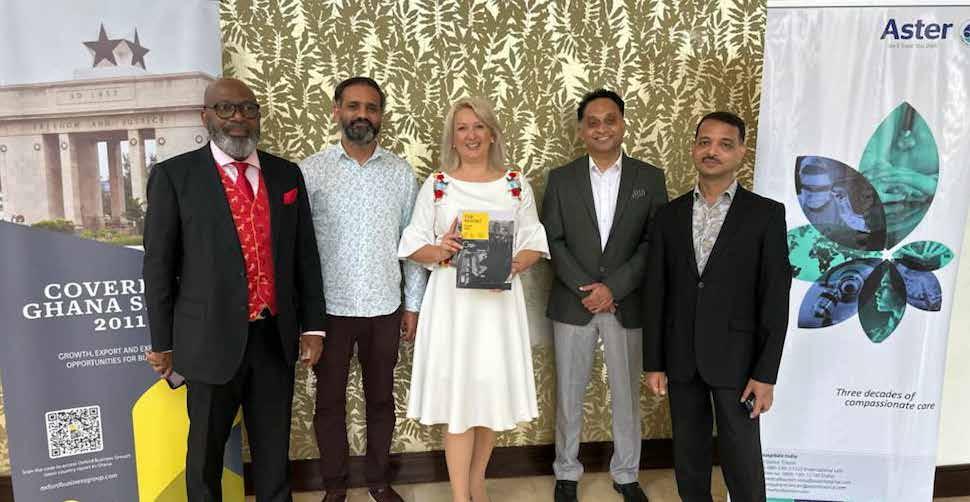
Commenting after the signing, Dr Rath described OBG as an ideal partner for AMIC, given its reputation as a go-to source of accurate, reliable business intelligence for investors seeking untapped opportunities in emerging
By Philip GebuFebruary 14, was chocolate day. I o ered some Ghanaian made chocolate to family and friends. How I wish we take away this Val’s day concept from the mind of the youth and input the chocolate day concept. Media must help because the history of Valentine’s day has been misconstrued by media and yesterday they were happily wishing people happy Val’s day instead of happy Chocolate day. The youth may see the day as an avenue to fornicate. Prior to Chocolate day, my daughter of 8 years told me daddy tomorrow is Val’s day. I asked her who told her tomorrow is Val’s day? She replied saying her friends were saying it in school. I then
markets like Ghana and the wider region.
“Oxford Business Group will be highlighting the potential in Ghana’s health sector, while also identifying uncharted areas for medical research and making medical data and information accessible to end-users,” he said.
“It is our hope at AMIC that the report will help attract the investments that are needed, especially in the manufacturing of medical supplies and vaccines in Ghana, the sub-region and Africa as a whole.”
Tarta said AMIC’s decision to choose Ghana for its head o ce as part of broader plans to modernise healthcare delivery across the region aligned well with the national overhaul gaining pace of medical facilities and services.
“Ghana is set to bene t from a range of new services and facilities making use of cutting-edge technology, through a wealth of public-private partnerships that include screening initiatives, surgeries and second opinions for diagnoses,” she said. “As part of its preparations to spearhead healthcare improvements across the continent,
research. I’m delighted that our on-the-ground representatives and, ultimately, investors eyeing Ghana’s potential, will bene t from this fruitful partnership.”
Also present at the signing, Dr Nitish Shetty, CEO of Aster Hospitals, Bangalore, one of AMIC’s partners, highlighted the pivotal role that AMIC was set to play in addressing gaps and challenges in Ghana’s healthcare system and others regionally.
“The African Medical Information Centre will be supported by all 30 of our hospitals in seven countries. Our 1500 doctors are leaders in their specialised elds and are keen to help with capacity-building locally, arranging training programmes and exchange programmes,” he said. “Our aim is that over time, together with our stakeholders in Ghana and across the wider region, we can address the challenges they face in the medical eld, while paving the way for this centre to
The Report: Ghana 2023 will be produced with AMIC, the Association of Ghana Industries, PwC Ghana and other partners. It will contain contributions from leading personalities in the public and private sectors, including: Kwaku Agyaman-Manu, Minister of Health; Yo Grant, CEO, Ghana Investment Promotion Centre; Ken Ofori-Atta, Minister for Finance; Joseph Boahen Aidoo, CEO, Ghana Cocoa Board; and Ernest Addison, Governor of the Bank of Ghana.
The Report: Ghana 2023 will mark the culmination of months of research by a team of analysts from Oxford Business Group. It will be a vital guide to the many facets of the country, including its macroeconomics, infrastructure, banking and other sectoral developments. The Report: Ghana 2023 will be available online and in print. It will form part of a series of tailored studies that OBG is currently producing with its partners, alongside other highly relevant, go-to research tools, including ESG and Future Readiness reports, country-speci c Growth and Recovery Outlook articles and interviews.
asked her what Val’s day is and she could not explain. I then corrected her and told her it’s not Val’s day but rather Chocolate day. To help sink this into her mind, I o ered her money to buy some Ghanaian made chocolates and she gladly enjoyed them. How I wished all parents will do same. By the way, has anyone tried those foreign chocolate being sold on our streets? They taste so arti cial and have melted unlike the Ghanaian made chocolate made inTema.
In 2005, the late Jake Obetsebi Lamptey and his advisors at the time saw the drifting away of our youth into an
unprecedented level of promiscuity. They then decided to introduce the Chocolate Day which has been a good one so far.
In those days young girls and boys will move around in the evening wearing red cloths ready for an outing which may end up in fornication. Jo Ellen Fair in her research article entitled African Studies review gave a detailed report on the rise of Valentine’s day in Ghana. She state that Valentine day was borrowed from abroad, altered to t local circumstances, Valentine's day is part of a complex set of imported and indigenous lifestyle market that are
used increasingly in urban Africa by individuals and social groups to construct identities as older and more traditional cultural norms and forms loosen their hold. The self-conscious choice and arrangement in one's life of these markers-some local, some imported, all under constant recon guration-increasingly, according to Chaney (1996, 2 is culture). As Chaney argues, lifestyle creation through choice does imply a new super ciality of culture or a looming monotony of global taste. Rather, the ability of individuals and groups to craft lifestyles through choice of symbols and

consumption of products empowers them by uniting them with like-minded people in their own society and abroad, while distinguishing and separating them from persons near and far whose preferences, behaviors, and values mark alternative paths of personal and progress. The growth of the celebration of Valentine's day in Ghana is associated with the privatization of broadcast media, the reestablishment of vibrant urban commercial sector, rising consumerism, and a reexamination in Accra (and throughout urban Africa) of the contours of courtship, and marriage.
Many in the West consider Valentine's day a thoroughly contemporary contrivance, a holiday manufactured by the greeting card industry. But the holiday has a deep history in Western culture: apparent pre-Christian antecedents in the Roman festival of Lupercalia; a pair of Saints Valentine putatively beheaded by Claudius II in the third century; churches and shrines dedicated to the martyrs' memory throughout Europe; and a long association of the holiday with the desires of the human heart (Chase 1956; Myers 1972; Baird 1990; Santino 1994; Schmidt 1995.)
Responding to increasing pressure from external funders (the World Bank, IMF, and private nanciers), the government of President Jerry Rawlings acceded in 1995 to demands for deregulation and privatization of national broadcast media. Radio was the rst broadcast medium to be deregulated, with the Voice of Legon (now named Radio Universe) as the rst private, nongovernmental radio station in late February few months later in April, Joy FM began broadcasting as Ghana's rst commercial station. Several stations followed, and by 1997
there were so many commercial stations operating in the Accra area. With so many new stations, the radio industry was confronted with problems of content and audience: what to broadcast, how to attract listeners, and how to deliver an economically viable audience to potential advertisers. Promotions seemed to be the answer.
"We got hold of broadcasting promotion books, and we ran with them," said Komla Dumor. Joy FM's morning personality. "Every station in town did the same. Dumor said Joy initiated Accra's Valentine day’s promotions in 1996 because the station "wanted to build a solid base listenership".
In view of the above, the establishment of Valentine's day in most especially the youth and with the increasing concern of promiscuity, The Chocolate Day (known as National Chocolate Day) was instituted to take away the mind of the youth away from Valentine's Day. It is a celebration instituted by the Ghana Tourism Authority in 2005. The celebration which is earmarked for the 14th February annually, is targeted at boosting the domestic consumption of Ghanaian chocolate and other cocoa based products, to promote domestic tourism and to give a healthy orientation to the celebration of Valentine's day. The initiative is also aimed at shifting the attention of the youth from engaging in sexual activities towards showcasing love to their loved ones through a gift of chocolate.
The activity was instituted by the Ghana Tourism Authority in partnership with the Cocoa Processing Company of Ghana.
At the launch of the celebration, the Minister made reference to the low consumption of cocoa products in the country even though the country was
the second largest producer of cocoa in the world and hoped that the institution of the day will encourage consumption among Ghanaians. The ministry also mentioned the proposed establishment of a cocoa museum following the initiation of the day.
Cocoa production has been the mainstay of Ghana’s economy since the 1870s. It dominates the agricultural sector and contributes about 30% of the country’s export earnings. Cocoa employs about 800,000 farmers directly. It also supports the livelihoods of others in the commerce, service and industrial sectors of the Ghanaian economy. This makes it an important generator of revenue. Chocolate comes from cocoa. On Valentine's day, instead of engaging in unproductive activities, it’s prudent to visit tourist attractions where the learning of cocoa will be unveiled. Businesses will also make money which will help the national economy. Cocoa Research Institute is one attraction many people could visit on the day. Another attraction is the Cocoa Processing Company in Tema. The Tetteh Quarshie farm must also not be left out. When these cocoa based attractions are promoted and visited, the end result will be a desire created in the youth to explore our chocolate and cocoa based tourist sites. School children must be made to travel to other regions sharing chocolate. When this is well promoted and sponsors attracted a great avenue to promote domestic tourism would have been put into reality.
How will green tourism be promoted?
Green tourism seeks to promote visits to green environments. Trees and nature are mostly green. As tourists (both domestic and international) visit
green sites, they will learn more about nature and our agriculture. One good destination to visit is the Cocoa Research Institute and the Tetteh Quarshie Farm not forgetting the Aburi Gardens as mentioned earlier on. The Cocoa Processing factory in Tema must also be a must go attraction. The process of learning the processing of Chocolate for our school children will be of great bene ts to us all.
Philip Gebu is a Tourism Lecturer/Trainer. He is the C.E.O of FoReal Destinations Ltd, a Tourism Destinations Management and Marketing Company based in Ghana and with partners in many other countries. Please contact Philip with your comments and suggestions. Write to forealdestinations@gmail.com / info@forealdestinations.com. Visit our website at www.forealdestinations.com or call or WhatsApp +233(0)244295901/0264295901.Visist our social media sites Facebook, Twitter and Instagram: FoReal Destinations
The International Monetary Fund (IMF) has appointed a Resident Advisor to the Bank of Ghana (BoG) to oversee nancial sector supervision in the country.
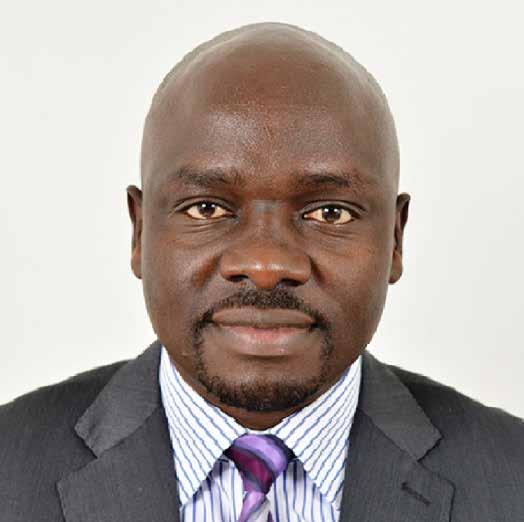
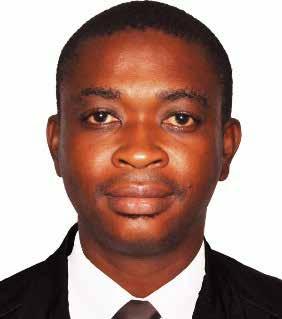
The fund appointed Leonard Chumo, an Irish and Kenyan, to the central bank this month to provide technical assistance and help build the capacity of the banking supervision function of the regulator.
He will stay for three years, a statement from BoG said.
BoG said in the Tuesday, February 14, press release that the appointment was at the behest of BoG and will be fully funded by Switzerland’s State Secretariat for Economic A airs (SECO).
“The Adviser’s placement is a continuation of cooperation in this area between BoG, the IMF and SECO that started as early as in 2015 and had already seen the assignment of a previous Adviser until 2018.
“Achievements from the past collaborative e orts include the passage of
the Banks and Specialised Deposit-Taking Institutions Act, 2016 (Act 930), the devel opment and issuance of the Corporate Governance Directive 2018, and the Capital Requirement Directive 2018,” the statement said.
It said the Mr Chumo brings rst-hand knowledge of supervisory work from leading central banks as well as previous technical assistance experience in the Western Africa region.
It said Mr Chumo started his assignment in BoG on February 6 this year and was expected to stay for three years.
“Among others, he will support the implementation of Pillar two and three of the Basel II/III capital frameworks, as well as strengthen the Risk-Based Supervisory framework at BoG.
“BoG wishes to express its utmost appre ciation to SECO for the continued funding of long-term technical experts from the IMF to the bank,” the statement said.
Ghana is closing in on a three-year US$3 billion support from the IMF to help reorganise its nances for the cedi depre ciation and in ation to stabilise.
Member of Parliament for Afram Plains North constituency in the Eastern Region, Betty Nana Efua Krosbi Mensah has been presented with the 2022 best Female lawmaker award she won ahead of her colleagues following a survey conducted by FAKS Investigative Services.
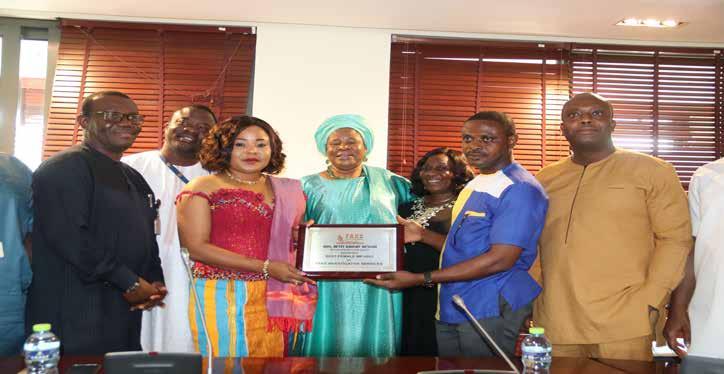
The young MP emerged as the overall joint winner of the awards together with Member for Ayawaso West Wuogon Constituency in the capital, Lydia Seyram Alhassan, among 40 ranked Female lawmakers in the country for their exceptional service to humanity.
Speaking at a brief awards ceremony in Parliament House on Friday 10th February 2023, an elated Betty Krosbi Mensah thanked FAKS Investigative Services for recognizing her contribution to society even as a rural MP whose constituents lack several social amenities.
According to her, even though the geographical location and the disadvantaged nature of the Afram Plains North constituency does not enable her count herself among the best, the award will spur her on to give o her best.
“..This award motivates me to do more for my people. I feel a special responsibility to champion the interests of my people, especially those on the Islands.”
“I am determined to do things di erently, using my platform as a Member of Parliament to bring the necessary development to reduce the challenges facing my people,” Hon Betty stated.
She recounted some of the developmental projects she has successfully executed for the people, especially the deprived and far to reach communities in the constituency.
These includes the reshaping and graveling of some feeder roads, building of health facilities, mostly CHPS Compounds, provision of scholarship to needy school children, erecting of pavilions for remote communities, payment of medical bills and support for persons living with disability among others.
She reiterated her resolve to work hard to justify the con dence reposed in her through the award.
Presenting the award, lead Investigator at Faks Investigative Services Mr Yaw Sarpong said the Afram Plains North MP was selected for the award following a thorough investigation in her work and visibility in the constituency, her work on the oor of parliament and based on the accounts of her colleague MPs, journalists and other stakeholders. She was supported by her colleagues including First Deputy Minority Whip, Ahmed Ibrahim to receive the citation.
The MP for Ho West, Hon Emmanuel Kwesi Bedzrah commended Betty for her hard work, describing it as a challenge to all MPs, especially the female colleagues in the Legislative House.
On her part, a female MP for Pusiga, Hon Laadi Ayi Ayamba congratulated her for the award and said, it was the hard work and the trust that the constituents have for her that earned the award and encouraged her never to let down the people who voted for her to represent them in parliament.
Ms Betty Nana Efua Krosbi Mensah entered parliament in 2017 after
winning the Afram Plains North in the December 2016 general election and retain the seat it in the 2020 general elections.
She has been working since then with the Chiefs and people of the area, a constituency with over 575 communities, where over 222 of the communities are on the Islands of the Volta Lake.
FAKS Investigative Services adjudged the Afram Plains North and Ayawaso West Wuogon constituencies – Betty Nana Efua Krosbi Mensah and Lydia Seyram Alhassan as best Female MPs for the year 2022.
The two MPs according to the 2022 report published by the Research and Investigative body topped the list of all Forty (40) Women Lawmakers in Ghana’s Parliament due to their hardwork and level of development championed in their respective constituencies in the year under review.
FAKS Investigative Services annually announces the performance of Ministers, Deputy Ministers, Regional Ministers, Members of Parliament, and Chief Executive O cers of State Owned Enterprises (SOEs).
Concerning Members of Parliament, FAKS said it’s team considers development in their constituencies and works in Parliament as well.
“Our team is made up of researchers, media practitioners and academia that do the assessment based on the outcome of the ndings they received.
The survey took place between the months of October and December, 2022 and it was the 11th Edition of FAKS’s project.
Respondents for the survey were civil society organizations (CSOs), teachers, students, business owners, drivers, traders, Journalists, traditional rulers and others.



Acting Executive Secretary of the Economic Commission for Africa (ECA), Antonio Pedro, has urged African nations to accelerate implementation of the African Continental Free Trade Area (AfCFTA) in order to become more resilient and globally competitive.
“Only through an accelerated and e ective implementation of the AfCFTA can Africa build su cient shock absorbers to build resilience,” said Mr Pedro in his remarks at the 42nd Ordinary Session of the African Union Executive Council meeting in Addis Ababa on February 15, 2023.
Launched in 2019 to establish a uni ed market of 1.3 billion people and a GDP of around US$ 3.4 trillion, the AfCFTA is poised to become the world’s largest free trade area with 55 member states.
Mr. Pedro deplored the fact that the COVID-19 pandemic and the
Russia-Ukraine war have caused a state of crisis, pushing 55 million people below the poverty line and exacerbating inequalities.
High global in ation has also led to tighter nancial conditions. Mr Pedro said despite Africa's economic growth of 3.9% in 2023 and 2024, more still needs to be done to compensate for the losses experienced in the past three years.
The Acting Executive Secretary pointed out that by fast-tracking the implementation of the AfCFTA, Africa can provide solutions to the global challenges of supply chain disruptions, food insecurity, climate change, and migration.
Highlighting that the AfCFTA provides the economy of scale to invest in manufacturing and increased intra-Af-
rica trade, Mr. Pedro said the free trade area would bring supply chains closer to home and inject self-su ciency in essential products such as medicines, food and fertilizers.
“By providing more opportunities for women and the youth, the AfCFTA helps reduce inequality and poverty, and improves inclusion,” he said.
However, Mr Pedro highlighted two challenges that require immediate attention – rati cation and implementation - and appealed to the ten African countries that have not yet rati ed the agreement to do so soon.
Commenting on resource-based industrialization, Mr Pedro said this should focus on value addition, smart operationalisation of local content policies, and tapping into global value chains.
He cited the Battery and Electric Vehicle (BEV) sector as one that could enable the continent to tap into a global value expected to reach US$8.8 trillion in the next three years and US$46 trillion by 2050. The ECA is supporting BEV value chain with “strong political will from the Democratic Republic of Congo and Zambia,” said `Mr Pedro.
ECA is also partnering with stakeholders to support the transboundary agro-industry park and special economic zone involving Zambia and Zimbabwe, which could address food security concerns and tap into Africa's food import market valued at about US$90 billion per year.
Mr Pedro pledged ECA’s continued support and collaboration with the African Union and other stakeholders to transform Africa into a globally
tive crisis communication management to repair the damage. That said, strategic thinking is crucial to the nuances of crisis communica -
Undeniably, the world economy is in a recession, and Ghana is not exempt. The question, how -

government communication been in these turbulent times?
In a democracy, citizens must not only be aware of the government's policies and activities, but must also participate, when provided with reliable, accurate, and timely information, particularly in periods of growing economic challenges.
Are the boundary-spanning activities of the government's communication machinery picking up the right cues to inform the right communication stratewith some demonstrating rage at current events.
Scapegoating
Responding to concerns, some -

denial response strategy that places the blame for the economic crisis on the COVID-19 pandemic and the Russia-Ukraine war. Ghanaians are tired of it and think the response is lame. What should have been adopted earlier was the rebuilding and bolstering of response strategies to acknowledge responsibility, request forgiveness, and explaining the situation.
Additionally, reminding Ghanaians of the government's past good works and assuring them that we are all involved in making it better, while soliciting support. Regrettably, the growing economic hardship has threatened the expectations of stake -
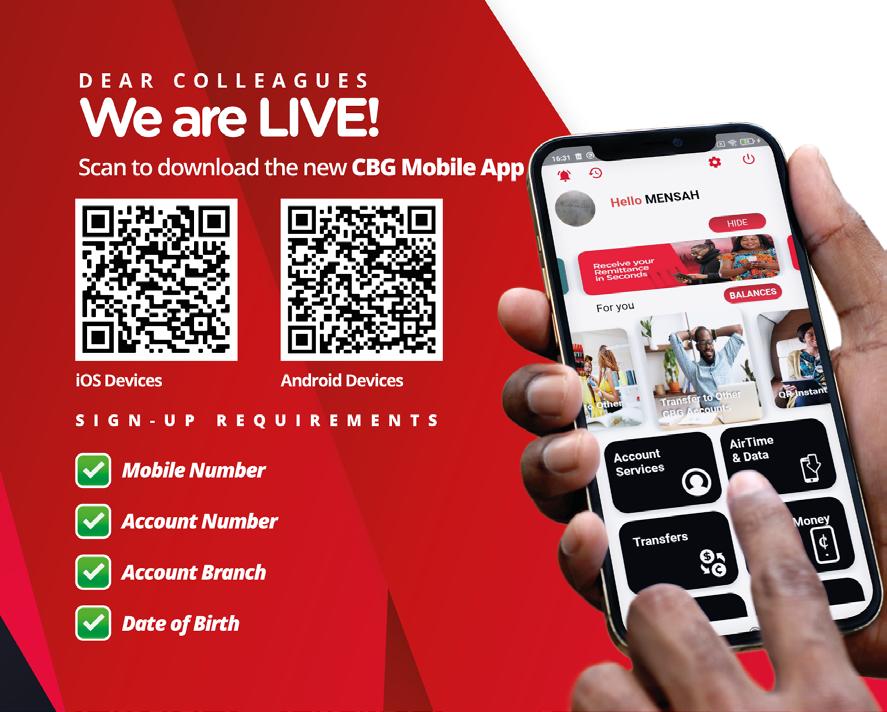
not only the nation's economy, but also the safety and moral fabric of the society.
crisis communication.
Therefore, to prevent hate speech, misinformation and disinformation, the government must ensure management.
Furthermore, it must ensure that the crisis communication is empirically tested and theory based. For instance, assess how Ghanaians are responding to the economic crisis and the response strategies being used, and adopt a theory that guides and explains why others are not.
It is, however, refreshing the President’s broadcast on Sunday, October 30, 2022, giving assurance that there was light at the end of the tunnel. It is also commendable that the Cabinet, the Economic Management Team (EMT), and the forex bureaus have met over the cedi depreciation.
Are these engagements enough? The government must broaden such consultations and also consider these crisis communication management recommendations:
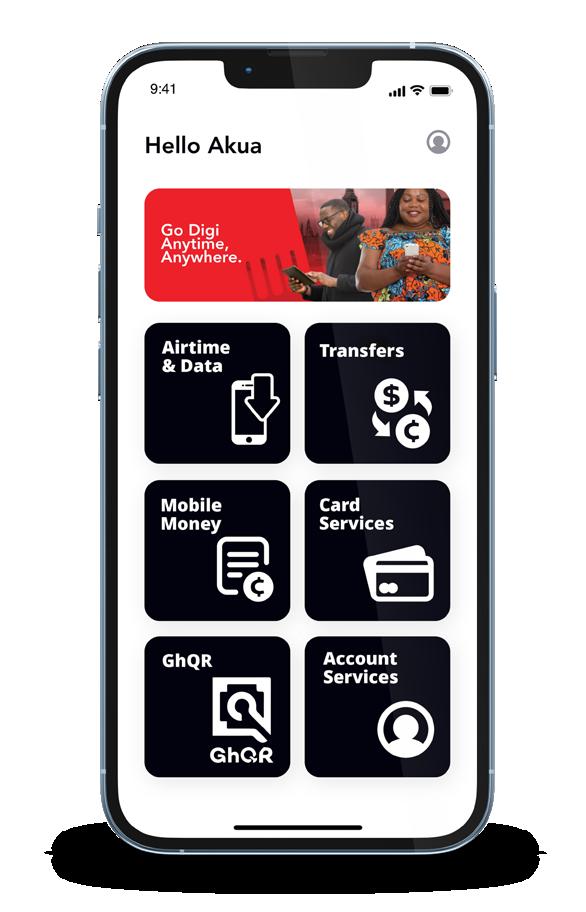
as a great place to start to put an end to the situation; it must be more cooperative with stakeholders and the public; it must speak with one voice and ensure consistent crisis message; it must respond quickly to issues, particularly those that have the potential to further divide the nation and exacerbate the crisis; it must not attribute the nation's economic problems to the Russia-Ukraine war and the COVID-19 pandemic; it must the average Ghanaian to understand them and also employ local languages in addition to English to disseminate information; it by experts, academics, and other key stakeholders. Outright rejection in crisis messages give an indication that you are not a listening government; it must be open and honest in crisis communication, and take post-crisis measures seriously.
All hope is not lost. The glass is half-full rather than half empty. Instead of focusing on the negative, let's consider the positive aspects of life and the things that bring us together.
The writer is a communications professional/member, Institute of Public Relations, Ghana/Ghana Journalists Association. E-mail: raymondbaxey@gmail.com

Huawei has launched smart photovoltaic (PV) solutions for all scenarios of the African residential market at the Solar Power Africa Conference 2023 held in Cape Town, South Africa.
At the press conference announcing the launch, Xia Hesheng,President of Huawei Digital Power Sub-Saharan Africa Region, said that Huawei was releasing three residential solutions: Power-M, LUNA, and the high-end luxury solution.

Xia said, “The three residential solutions will help users cope with daily challenges such as load-shedding, which are prevalent across the region. Meanwhile, the residential market faces some challenges such as user experiences, mixing manufacturers, quality, service, e ciency and aesthetics.”
Xia noted that “Huawei is focusing on “4T” Technologies(Watt/Heat/Battery/Bit), this will drive the residential PV scenarios with high quality products that are not only aesthetically pleasingbut products that o er high quality system level solutions that integrate digitalisation and intelligence into the PV industry.”
Over its 25 years of operating in Sub Saharan Africa, Huawei hasbuilt a deep understanding of the region’s energy and technology requirements. “We supply smart photovoltaic (PV) solutions for all scenarios in the African residential market, committed to bringingclean energy to every home.”
Nick Lusson, VP of Huawei Smart PV
Sub-Saharan Africa Region, gave an overview of the features and advantages of the three residential solutions at the launch.
Power-M is a high-quality power supply system for multi-scenario applications, exible for use in apartments, houses or large villas. “Huawei has demonstrated its aesthetic design skills as always, by bringing to consumers a sleek design energy system with the ultimate aesthetics. Thanks to the all-in-one and modular design, theinverter and battery are perfectly integrated, consumers can exibly choose the number of battery modules to expand the capacity from5kWh to maxim 45kWh whenever they want. The Power-M supports seamless switchover between multiple energy inputs, such as solar, grid, and generator. In order to provide a better home usageexperience, Power-M has a fan-less construction with
sleep-grade noise, the operation sound level is less than 29dbm. The unique plug and play design makes for an easy and quick installation in around two hours,” he said.
LUNA is an intelligent power system integrating smart power generation, smart power storage and smart power consumption. With the Huawei smart module controller, the homeowner canmaximize the roof installation capacity, resulting in between 10-30% more panels installed. The smart module controller can also signi cantly increase solar power generation by improving e ciency by 5-30%. “To ensure the safety of installers and roofusage, the module-level shutdown function provides a safer roofvoltage. The intelligent battery storage, ESS, can provide 10% more usable energy with the built-in optimiser in each battery module,” Lusson explained.
The LUNA AI system can accurately predict photovoltaic power generation and household electricity consumption under di erent climate scenarios based on big data learnings of weather and electricity consumption habits. Using theFusionSolar APP, consumers can remotely monitor and manageLUNA anywhere anytime.
“What’s more, Huawei brings high-end solutions to large villa owners. Thanks to the one-stop solution and premium service, the end users can enjoy an ultimate user experience for a fully integrated luxury power generation villa,” Lusson explained.
Huawei and its local partners concluded the launch with a with Huawei smart photovoltaic (PV) solutions for all scenarios of theAfrican residential market, together committing to bring green energy into every home and creating a better life experience for the people of Africa.
High rates of growth in the past two decades have resulted in reduced poverty levels in Africa. Between 2000 and 2019, the share of population living in extreme poverty decreased from 53.4 percent to 40.1 percent but the absolute number of poor remains high. Today, 546 million people are still living in poverty in 2022.
The 55th Session of the Economic Commission for Africa (ECA) Confer ence of African Ministers of Finance, Planning and Economic Development (CoM2023) will be held from March 15-21, 2023, in Addis Ababa, Ethiopia.
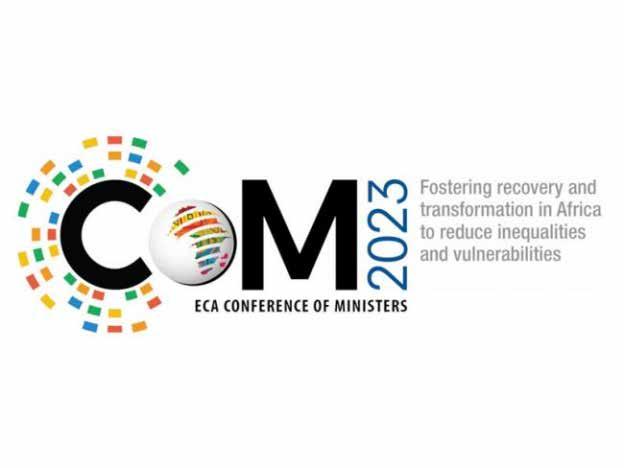
The Session, a statutory meeting of the ECA, will review the state of economic and social development in Africa as well as progress on regional integration.
theme, ‘Fostering recovery and trans formation in Africa to reduce inequalities and vulnerabilities.’ It will be attended by African ministers of Finance, Planning and Economic Development, representatives of member States, entities of the United Nations system, pan-African nancial institutions, African academic and research institutions, development
A preparatory meeting of the Committee of Experts of the Conference of African Ministers of Finance, Planning and Economic Development will precede the 55th Session followed by the ministerial segment of the Conference which will deliberate on the development agenda of Africa on the back of a raft of economic and political
ECA’s Acting Executive Secretary, Antonio Pedro, said global shocks are turning millions of vulnerable people into the continent’s new poor, reversing decades of progress. The COVID-19 pandemic has pushed an additional 55 million Africans below the poverty line, and the impact of the war in Ukraine is expected to further compound the challenge.
Mr. Pedro said even when growth rates were high in Africa, everyone did not bene t equally. For example, in 2022,
the top 10 percent of wage earners received about 30.69 percent of total income.
High inequality, along with high levels of poverty, creates a vicious cycle in which structural bottlenecks persist, rendering the population in Africa perennially vulnerable to both economic and non-economic shocks.
“The ability of African countries to e ectively tackle poverty and inequality is now severely constrained given declining economic growth, narrowing scal space, rising debt, commodity shocks and tightening global nancial conditions,” said Mr. Pedro, adding that, “The risk of missing the poverty and inequality targets set out in the 2030 Agenda for Sustainable Development and Agenda 2063: The Africa We Want, of the African
Union, is higher than it has ever been before.”
The 55th Session of the Commission aims to renew focus and action on reducing poverty, inequality and other factors that have left the African population continuously vulnerable to these scourges.
Mr. Pedro urged that recovery e orts
must be pro-poor and inclusive, with a view to fostering a new social contract that o ers equal opportunity for all.
Considerable opportunities to reach these goals exist on the continent and beyond, including through activities carried out under the African Continental Free Trade Area, green investments, digital transformation and reforms to the global nancial architecture.
Following the multiple nancial, health, and climate crises a ecting Africa, countries should accelerate inclusive recovery e orts to boost economic growth, the Economic Commission for Africa’s Acting Executive Secretary, Mr. Antonio Pedro, has urged.

Speaking at a press brie ng ahead of the 55th Session of the Economic Commission for Africa Conference of African Ministers of Finance, Planning and Economic Development (CoM 2023), Mr. Pedro said the impact of the shocks caused by COVID -19, the war in Ukraine and climate change have pushed more people into extreme poverty and have increased inequality worldwide.
“Africa is falling even further behind, with the continent now accounting for the highest proportion of the world’s poor of any region globally,” Mr. Pedro warned, emphasizing that the growing number of newly poor and vulnerable people makes it harder to close the gap between the rich and the poor.
“Recovery e orts must be pro-poor and inclusive, with a view to fostering a new social contract that o ers equal oppor tunity for all,” he said, adding that, “It is important that our growth does not leave anyone behind and if we do so then the social contract that is key to have stability and prosperity will be completely disrupted.”
Mr. Pedro indicated that pro-poor and inclusive recovery must be deliberately incorporated in the design and imple mentation of policies, including by securing the input of all stakeholders such as Small and Medium Enterprises in such processes.
The 55th Session of ECA’s Committee of Experts of the Conference of African Ministers of Finance, Planning and Economic Development, a statutory meeting of the ECA will be held from 15 to 17 March 2022. It will be followed by the Ministerial Segment of the Confer ence on 20 and 21 March 2023.
The Conference brings together Ministers of Finance, Planning and Economic Development from African member States, governors of central banks, entities of the United Nations system and pan-African nancial institutions.
In addition, the conference will also attract African academic and research institutions, development partners, intergovernmental organizations and other key stakeholders to discuss statutory issues pertaining to the function of ECA, engage and exchange views on economic and social development in Africa as well as take stock of progress on regional integration and other issues pertinent to the continent.
This year, the Committee of Experts and the Ministerial Segment will convene under the theme ‘Fostering recovery and transformation in Africa to reduce inequalities and vulnerabilities.
“The ability of African countries to e ec-
also severely constrained given declining economic growth, narrowing scal space, rising debt, commodity shocks and tightening global nancial conditions,” said Mr. Pedro, warning that Africa faces a higher risk of missing the poverty and inequality targets set out in the 2030 Agenda for Sustainable Development and Agenda 2063.
Lamenting that the COVID-19 and the Ukraine con ict have wiped some of the development gains made in the last decade in terms of economic growth, social inclusion and poverty reduction, Mr. Pedro said Africa’s trade ows and supply chains were also disrupted.
As a result, it was pertinent for Africa to promote local solutions. He said for its part Africa has reacted positively to the impacts of COVID-19 with the creation of the Africa Exchange Trade Platform (ATEX) digital platform to boost trade in critical commodities under the AfCFTA.
Mr. Pedro said the Conference of
and Economic Development aims to renew focus and action on reducing poverty, inequality and other factors that have left Africans vulnerable to these scourges.
He noted that Africa has considerable opportunities to build strong, resilient and competitive economies through accelerated implementation of the African Continental Free Trade Area, development of carbon credit markets, fostering the emergency of regional value chains in the battery and electric vehicle subsector, to name a few.
Speaking at the same press conference, Second Vice-Chair of the 54th Bureau of the ECA and Zimbabwean Ambassador to Ethiopia and Permanent Representative to the African Union and ECA, Ms. Sophia Nyamudeza said that the theme of CoM 2023 was timely as African countries are recovering from COVID-19 and were experiencing world food crisis and su ering climate change shocks.
access to basic healthcare.
He made these comments at the opening of a 5-day workshop in Accra organized by the PharmAccess Foundation in Ghana in partnership with Leapfrog to Value and the Christian Health Association of Ghana.

According to him, data analytics, and digitalization of the NHIA system will be key to the implementation of Value-Based Care.
The NHIA has in recent years deployed digital technologies to enhance the provision of healthcare in Ghana. Among these technologies are the mobile NHIS renewal system which helps subscribers to renew and pay their insurance premiums in a convenient way, and the digital claims submission, CLAIM-IT application, which helps providers to submit their claims without hassle.
Dr. Bernard Okoe Boye said the digitalization of these processes has enabled the NHIA to analyze and visualize its data to aid decision-making for improving the sustainability of the scheme. "Well, I am excited because you can
managing providers and subscribers. “These digitalized processes allow us to consolidate all the information we have about Ghanaians who attend hospitals."
He said.
He revealed that careful analysis of claims using technology has enabled the authority gain insights into the disease patterns of subscribers and the cost of care for these diseases over time.
Speaking of Value-Based Care, he mentioned that it makes provision for investing in preventive interventions that improve the health of the population. "VBC will tell you where to push your resources, so that you have the best outcome, and that is what we are here to do," Dr. Okie Boye said.
Dr. Okoe Boye added that the VBC will be a component of the NHIA's quality strategy to reform how healthcare is delivered and paid for in Ghana.
He acknowledged that the current system is a drain on the government's limited resources and that a rethinking of the current system will help contain the escalating payments in government claims. He further appealed for expedit-
the Christian Health Association of Ghana, (CHAG) Dr. Peter Yeboah said the current challenges in health insurance administration have magni ed the need for VBC.
The new model, according to Dr. Yeboah, will reduce the burden on the scheme when it comes to paying claims. He said the current National Health Insurance Scheme (NHIS) rewards the volume of healthcare delivered rather than the quality of service.
Dr. Yeboah further noted that “the central goal of any health system is to provide optimal health outcomes – rst, to individuals and, second, to ensure societal wellbeing at all levels. And therefore, the value-based Care concept is about the way healthcare is supposed to be organized, delivered, and paid for. In other words, rather than the volume of services, it is the focus on the value, the health that could be gained from the resources available to the entire health sector."
He emphasized that the VBC will ensure optimal clinical outcomes for clients
as well as incentive criteria for the value-based Care to be piloted in Ghana. The pilot is expected to assist critical decision-making as well as policy formulation in a bid to improve healthcare delivery in Ghana.
The NHIA CEO commended PharmAccess Foundation for leading the way with digital technologies to improve healthcare delivery in Ghana.
Also at the event, Operations Manager at PharmAccess Foundation in Ghana, Dr. Gifty Sunkwa-Mills, said the Value-Based Care model, when implemented, will provide transparency for providers into outcomes and cost data.
“We are aligning patients, payers, and providers to ensure that we deliver the best quality of care at the most e cient cost. So, it’s a model where we measure outcomes, deliver, and then pay for the healthcare using a cost-e cient approach, while focusing on clinical outcomes, quality of care and client experience of care" Dr. Gifty Sunkwa-Mills added.
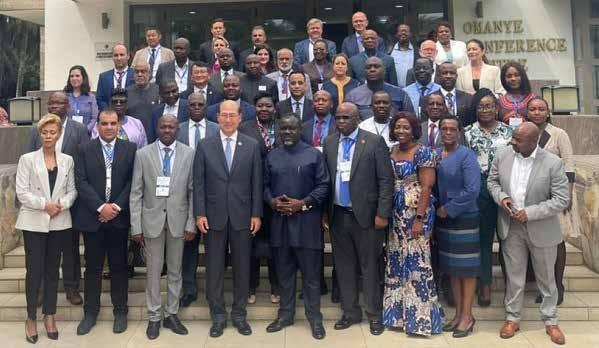
clients within the entire health system, while deepening e ciency gains via cost containment," he added.
The NHIA and its partners PharmAccess Foundation, Leapfrog to Value, and the Christian Health Association of Ghana have begun work on a human-centered design for piloting. The design will include parameters for the selection of
a care pathway, measurement, delivery, and payments as well as incentive criteria for the value-based Care to be piloted in Ghana. The pilot is expected to assist critical decision-making as well as policy formulation in a bid to improve healthcare delivery in Ghana.
The NHIA CEO commended PharmAccess Foundation for leading the way
with digital technologies to improve healthcare delivery in Ghana.
Also at the event, Operations Manager at PharmAccess Foundation in Ghana, Dr. Gifty Sunkwa-Mills, said the Value-Based Care model, when implemented, will provide transparency for providers into outcomes and cost data.
“We are aligning patients, payers, and
providers to ensure that we deliver the best quality of care at the most e cient cost. So, it’s a model where we measure outcomes, deliver, and then pay for the healthcare using a cost-e cient approach, while focusing on clinical outcomes, quality of care and client experience of care" Dr. Gifty Sunkwa-Mills added..

A legislation that seeks to safeguard the rights of consumers is being worked on and expected to be laid in parliament soon, caretaker Minister for Trade and Industry, Samuel Abu Jinapor, has announced.
Hitherto, consumers had no remedy over unfair trade practices, but with the new bill in the o ng and being the rst of its kind, it become signi cant for people and businesses.
Presenting a statement on the oor of the House on yesterday, Mr. Jinapor stated that most countries have Consumer Protection Policies and Legislation that secure the rights of consumers against unfair practices.
He cited instances such as Australia’s Competition and Consumer Act, 2010; Canada’s Consumer Product Safety Act, 2010; the UK’s Consumer Rights Act, 2015; South Africa’s Consumer Protection Act, 2018; and India’s Consumer Protection Act, 2019.
He added that most jurisdictions also have special bodies that deal with consumer protection, citing the Competition and Consumer Commission of Australia, the Federal Competition and Consumer Protection
Commission of Nigeria, the Competition Commission of Kenya, and the Competition and Consumer Commission of Singapore as examples.
Ghana’s attempt to protect consumers predate attainment of independence, with statutes like the Weights and Measures Ordinance, 1896 (Cap 188) and the Control of Prices Regulations, 1949 (No. 25 of 1949).
Despite several e orts by successive governments, the minister said the country has not been able to develop over the years a single legislation for the protection of consumers.
Currently, the country’s legal and regulatory framework for the protection of consumer rights is fragmented in di erence pieces of legislation. Amongst them being the Public Utilities Regulatory Commission Act, 1997 (Act 538), the National Petroleum Authority Act, 2005 (Act 691), the Electronic Communications Act, 2008 (Act 775), the Public Health Act, 2012 (Act 851), and, recently, the Ghana Standards Authority Act, 2022 (Act 1078).
Addressing the Parliamentary Press Corps (PPC) after he presented his statement, Mr.
Jinapor said “I will sign it o in cabinet and they will examine it, and we hope that they will approve it, which will mean that we will come back to this House and I see that the sentiments in parliament suggest that there will be a lot of enthusiasm and support for this kind of legislative intervention.
Hopefully, when we are able to pass it through parliament, Ghana will for the rst time have a Consumer Protection Right Act. We will have a piece of legislation which deals with consumer protection and culminate into having a state agency which will be responsible for ensuring that we protect consumers in our country, that is the gist of what I came to say in parlia ment.
I know that I am not going to be long at the Ministry of Trade but we have to begin and I have no doubt that the trade minister designate will drag this when he gets into o ce.
This is such a crucial interven tion that is long overdue and all of us have an example of having being shortchanged or having procured a good or
service and didn’t get what they paid for or value for money and yet didn’t have remedy and were left to themselves.”
Further, the minister indicated that due to the absence of a legislation, it has led to a signicant part of the market remaining unregulated in terms of consumer protection, leading to a constant violation of consumer rights without adequate remedy.
In those areas that seem to be regulated, there are instances of jurisdictional con ict among the various regulators, leaving the consumer with no remedy. “In short, consumers are not getting value for money.”
these complexities, coupled with the general lack of consumer awareness, lack of access to the courts absence of low-cost, quick, and accessible fora and methods for resolution of consumer complaints, low levels of consumer activism, and considerable institutional capacity constraints, require a legislative intervention to ensure that the rights of consumers are adequately protected.
On 15th March 2023, the world will be celebrating Consumer Rights Day, a day set aside to raise global awareness about consumer rights and needs, to advocate for the respect and protection of the rights of all consumers, and to protest against market abuses and social injustices that undermine
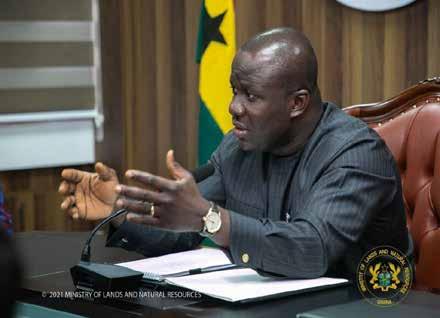
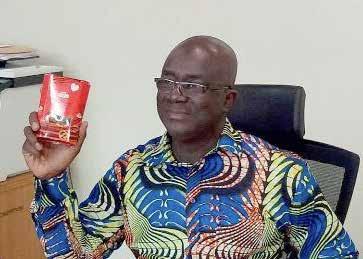
His resignation will take e ect from March 21, 2023, the company said in a circular to investors today, Thursday.
“The board has put in place wide-ranging measures to ensure the seamless operations of CPC until a substantive replacement is found.
“The market will be noti ed before March 21, 2023, of the
EDITOR: BENSON AFFUL editor@business24
new MD or the one who will be acting in the position until a substantive MD is appointed,” the statement said.
It further assured the company’s stakeholders of CPC’s commitment to the highest standards of corporate governance and continuity of operations.
Prior to his appointment to the CPC, Nana Boateng I was the
deputy MD of PBC Limited. It was during his tenure that the company revitalised its operations with the introduction of new lines and products as well as the expansion of operations to enable the government to meet its target of processing more than 60 per cent of cocoa beans produced.
PUBLISHED BY BUSINESS24 LTD